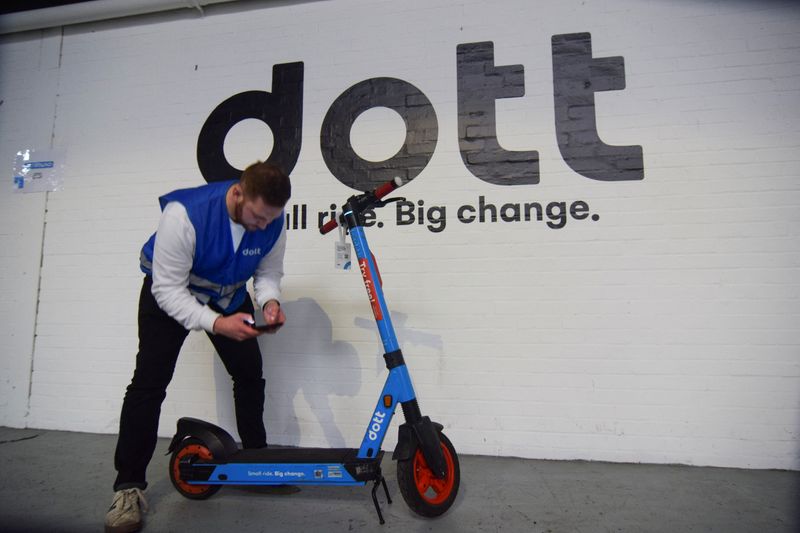By Nick Carey and Paul Lienert
(Reuters) - While swappable batteries are slow-burners in the electric car market, they have been a quick hit for e-scooters and e-bikes, making it easier and cheaper for rental companies to keep the small vehicles available on city streets.
But the fast-growing micromobility industry faces a bottleneck as companies, reluctant to relinquish their own tech secret sauce, resist widespread standardization of batteries, a development that could turbocharge efficiency.
When e-scooters first hit the streets in large numbers a few years ago, major providers like Dott and Tier had to shove their scooters into vans daily and haul them to suburban warehouses to charge overnight - adding to urban congestion and meaning those scooters were not out on the streets ready to rent.
Most major providers have since adopted swappable batteries in a global micromobility market where revenue was under $3 billion in 2019 before the pandemic hit and could hit $10 billion in 2025, according to industry estimates.
"Swappable batteries have been a game changer for us," said Tinia Muehlfenzl, vice president of market development for Berlin-based Tier. "We didn't have to collect the entire scooter anymore to charge them, we could do it right there on the street."
Micromobility providers now send out crews on electric cargo bikes or in electric vans to swap batteries during the day. That keeps the scooters or bikes in circulation and cuts down on congestion.
In London, Dott workers like Zhelyo Kolev, who travels around in an electric Maxus van, say they can check tires and brakes or undertake minor repairs while replacing batteries in seconds.
Swappable batteries are now such a feature of Europe's micromobility landscape that cities look favorably on them in tenders for operators to launch e-scooter and e-bike services because they reduce congestion and emissions.
TECH DILEMMA
But like major automakers, some e-scooter and e-bike providers have little desire to give up their own battery technology in the interest of standardization, which would enable large public swapping stations where consumers could swap out their own batteries.
The process is easier for batteries that can weigh around 5 kg, a fraction of those in electric car batteries which can weigh 500 kg.
Tier's Muehlfenzl said the company was in favor of standardization. But she acknowledged that for everyone, Tier included, giving up their own battery technology for a common industry standard is tough and will take time to agree on.
"It would be very tricky because, where would you start and where would you end?" she said. "You'd need to apply your own infrastructure to standards you don't own and maybe don't know."

Mina Nada, chief executive of Zoomo, an Australian provider of electric delivery bikes, said that increasing regulation and industry consolidation would likely lead to more standardized e-bike batteries - or at least standardized charging systems.
"It's going to be difficult to get to complete standardization," he added. "But I also see a path toward consolidation and less variability than what we have today."